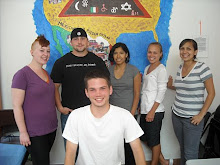 Hostel de la Luz - a pretty place but at what price? According to legend, this small town is the birthplace of the revered Aztec god Quetzalcóatl. Located in between impressive mountains, Amatlán proved to be inhabited by aspiring business people who were proud to share their professional experiences with us.
Hostel de la Luz - a pretty place but at what price? According to legend, this small town is the birthplace of the revered Aztec god Quetzalcóatl. Located in between impressive mountains, Amatlán proved to be inhabited by aspiring business people who were proud to share their professional experiences with us.Upon our arrival to Atekokoli, an alternative medicine practice, we quickly learned about the community living in Amatlán. It is part of the municipality of Tepoztlan, and is the smallest of the four towns involved. All of the land is communal, according to the ways of the town, there is no private property. Unfortunately, citizens are beginning to sell their land to foreigners looking to build weekend homes in the beautiful area. This land, often, happens to be the best quality, and pushes the poor to the outskirts of town.
We also visited Hostel de la Luz, a hotel focused on personal development using a holistic spiritual approach. Designed by a plastic surgeon from Mexico City, Hostel de la Luz is a pricey and luxurious place with an incredible view. When the owners first approached the citizens of Amatlán for approval to start building, they promised to only hire workers from the community and to aid with municipal projects. One of the unique things about Amatlán is that the community works without pay to complete municipal projects, such as, paving a road. As some of us were told by the host families we stayed with, Hostel de la Luz’s loving philosophy does not transpire to their treatment of employees. They are paid poorly paid and receive little benefits. For me, this was unbelievable given the prices of the rooms and services at the hotel. It seemed to me that Hostel de la Luz could easily afford to increase employee salary and help the community more.
Aside from visiting a foreign business prospering in Amatlán, we met with a local businessman by the name of Don Lucio Perez. Excluding hiking in the mountains in pouring rain with my host family, I had the best time hearing about Don Lucio's up and coming wine business. It was exciting to find out about the evolution of his company, Amatlán. I was a little surprised to hear that he wanted to keep it a family business, but then I remembered that many businesses in Mexico are family-owned. He spoke to us about the challenges of acquiring patents and expanding his company with a government that is highly regulative. The small business development program that is funded by the government requires him to pay a monthly tax of over 1,000 pesos – how paradoxical. His experiences demonstrated some of the problems with starting a business in Mexico. Despite hindrances such as these, Don Lucio is doing well and I hope to buy his delicious Milk Punch a grocery store in the United States one day.
Overall, the places we visited in Amatlán were a great contrast with our visits in Mexico City. Don Lucio's talk gave us insight to the emergence of a business, whereas our visits to Boing and Hospira Pharmaceuticals taught us about the organization of established companies. Can't wait to go back and visit my host family!




